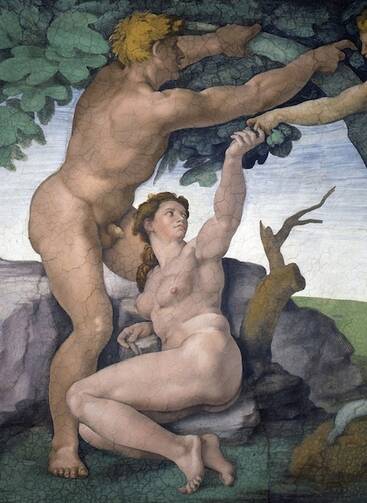Two days ago I blogged about Bryan College and its requirement (reported on by The New York Times) that the college's faculty must now pledge its fidelity to a particular understanding of Genesis 3: namely, that God created Adam and Eve "by a special formative act, not from previously existing life forms." This position is unsupported by a number of converging sectors of modern science, and it raises once more the question of the status of Adam and Eve in Christian and specifically Catholic theology.
It's no stretch to say that this issue—the historicity or non-historicity of Adam and Eve, or some other third way—is one of the most vexing issues in Catholic theology. In my own teaching experience, few issues confound students more than this topic. There may be no passage in Scripture that more dramatically brings forth the tensions between faith and reason, between the claims of religion and the facts of modern science.
How, precisely, does the Catholic Church understand the matter?
The encyclical Human Generis, issued by Pius XII in 1950, says the following:
This seems to be pretty clear: Catholics must believe that an actual Adam truly existed. Moreover, and this is perhaps more challenging, Pius XII says Catholics must reject polygenism, the theory that humans descended from more than one original pair. Put another way, Pius XII seems to be requiring Catholics to embrace monogenism—i.e., that we all descended from Adam and Eve. But modern science falls squarely on the side of polygenism: see, for example, this story from NPR and this thorough article on the matter from the Biologos foundation.
Adding another layer to consider, the Catechism of the Catholic Church notes: "The account of the fall in Genesis 3 uses figurative language, but affirms a primeval event, a deed that took place at the beginning of the history of man. Revelation gives us the certainty of faith that the whole of human history is marked by the original fault freely committed by our first parents."
What are we to make of this juxtaposition -- that between figurative language an actual primeval event? Is the Church meaning to say it's a historically true event captured in poetic terms? When it says "at the beginning of the history of man" and "our first parents," is this to be understood as a rejection of polygenism (per Humani Generis), or something else?
Lots of questions, and an ideal topic for an ambitious graduate student, not to mention a new encyclical.
In the meantime, what is a Catholic to think? Although questions remain, a number of commentators have undertaken to provide clarity on this question. I recently cited the excellent and thorough overviews of America contributor and biblical scholar John W. Martens (see here and here). You can also see David Gibson's blog entry on the matter (with a number of helpful links) from November 2011 at dotCommonweal. And not least, see the video below from Fr. Robert Barron, who says of Adam: "We're not talking about a literal figure; we're talking in theological poetry."









I am not sure what this statement means. It sounds like a put down. Some descent is possible but what is meant by the term "common descent" here. If you read my comment again, I do not rule out some descent but made a point that there is no known mechanism that can explain it. As far as "universal common descent", there is no known naturalistic process that can justify accepting it. The problem is how is all the new information created in the genome over the course of history. Nobody has a clue.Thank you to everyone who has offered a comment or a response. I really appreciate your reading and your willingness to contribute to this discussion.